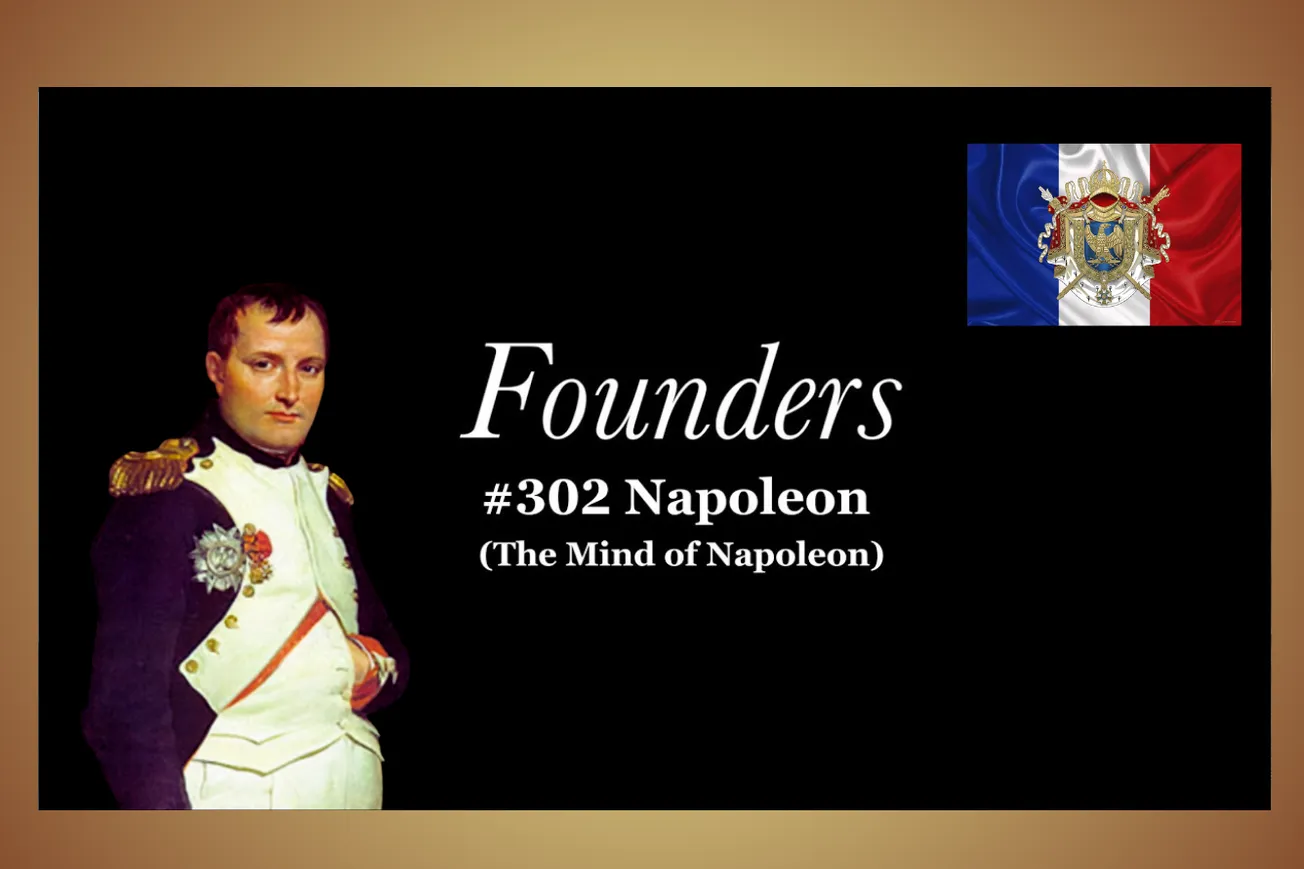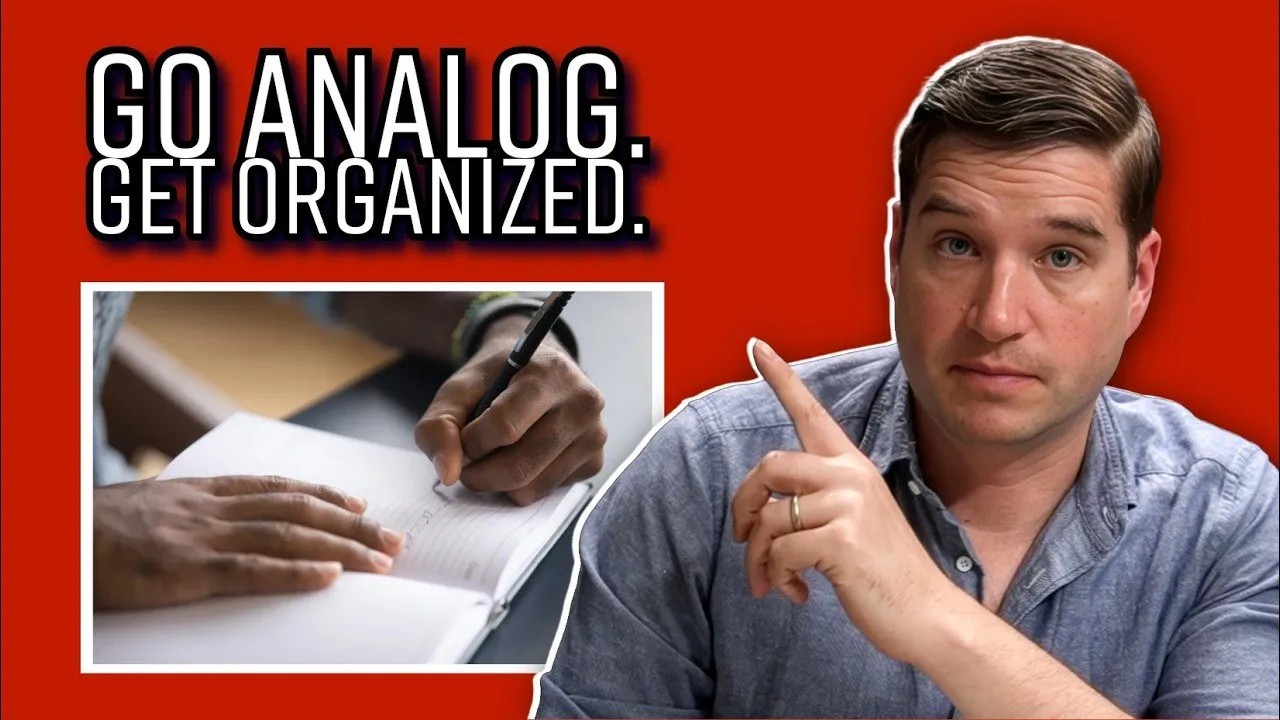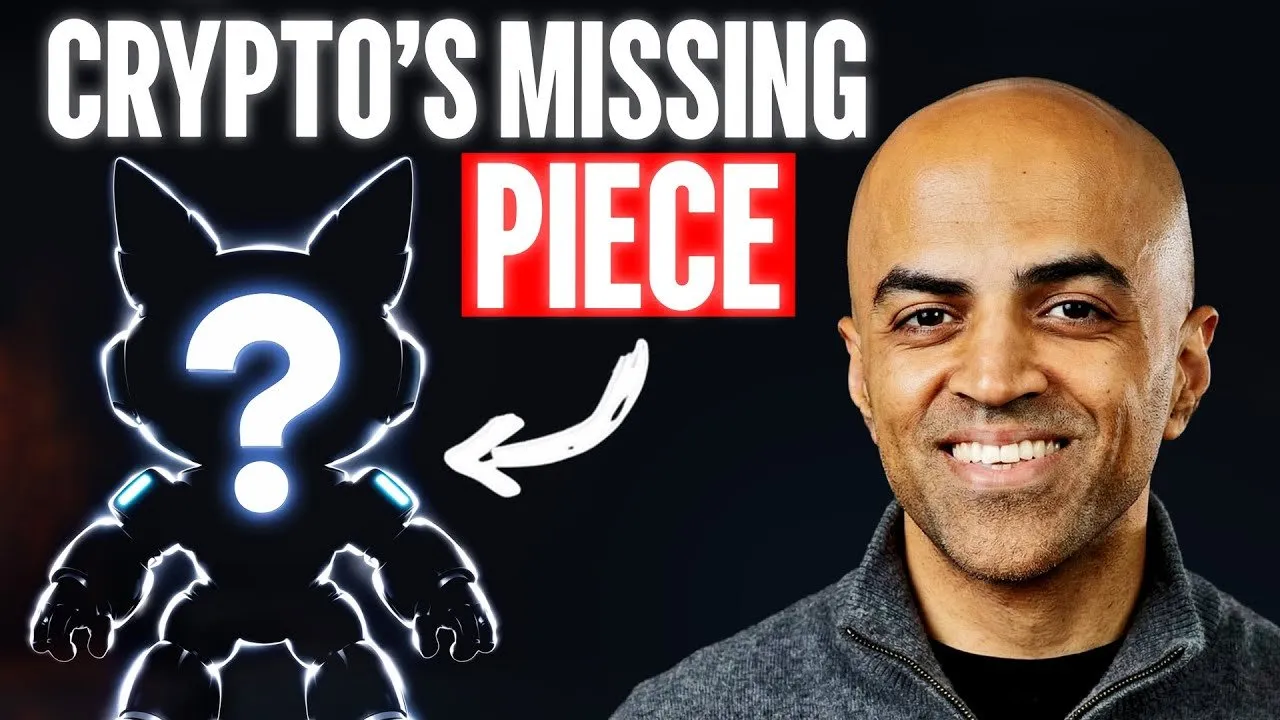Table of Contents
Three hundred pages of Napoleon's direct quotes reveal the strategic thinking and psychological frameworks that built an empire and continue to influence great leaders today.
Key Takeaways
- Destiny must be fulfilled through relentless action - every thought should be a step toward execution rather than endless planning
- Success creates legitimacy and changes how others perceive you, making achievement the ultimate validation of strategy
- Human psychology centers on self-interest and fear - effective leadership requires understanding and leveraging these fundamental motivators
- Boldness in execution combined with extreme caution in planning creates the optimal balance for achieving ambitious goals
- Learning from history's great figures provides strategic frameworks that can be adapted across different fields and eras
- Winning solves most problems while momentum from victories creates compound advantages that enable even greater achievements
- Control of information and messaging becomes crucial for maintaining morale and shaping perception during challenging periods
- Ambition requires total sacrifice of comfort and conventional happiness in service of long-term legacy and impact
- Revolutionary changes cannot be stopped, only directed by those bold enough to position themselves at the forefront
Timeline Overview
- 00:00–08:30 — Destiny and Ambition: Napoleon's core doctrine that destiny must be fulfilled through sacrificing everything comfortable for long-term impact, viewing ambition as essential as breathing
- 08:30–15:45 — Action Over Planning: Why hesitation proves fatal while immediate execution following careful preparation enables world-changing achievements, plus Napoleon's definition of luck as planned preparation
- 15:45–23:20 — Learning from History: How Napoleon studied Alexander, Caesar, Frederick the Great, and other conquerors to extract strategic principles applicable to his own campaigns
- 23:20–30:15 — Human Psychology Mastery: Understanding that people are motivated only by self-interest and fear, with practical applications for leadership and influence
- 30:15–37:30 — Success as Ultimate Validation: Why achievement changes perception and creates legitimacy, illustrated through Washington's transformation from rebel to respected leader
- 37:30–44:45 — Strategic Communication: Napoleon's approach to controlling information flow, acting as his own propaganda minister, and shaping public opinion through careful messaging
- 44:45–52:10 — Military Strategy Principles: Core maxims including concentration of force, speed of execution, and exploiting every possible advantage to increase victory probability
- 52:10–59:25 — Boldness and Calculation: The paradox of being extremely cautious during planning while showing unlimited boldness during execution phases
- 59:25–66:40 — Revolutionary Mindset: Understanding that major changes cannot be stopped, only directed by those willing to position themselves as leaders of inevitable transformations
- 66:40–73:00 — Legacy and Immortality: Napoleon's obsession with leaving lasting impact and being remembered throughout history as motivation for extraordinary effort
Destiny as Life's Ultimate Purpose
Napoleon's entire philosophy centered on discovering and fulfilling personal destiny through relentless action. "All my life I have sacrificed everything - comfort, self-interest, happiness - to my destiny. Destiny must be fulfilled. That is my chief doctrine." This wasn't abstract thinking but practical strategy for organizing every decision around long-term impact.
His view of ambition differed from casual goal-setting, representing instead a fundamental life force. "If I have any ambition, it is so natural to me, so innate, so intimately linked with my existence that it is like the blood that circulates in my veins, like the air that I breathe." This biological metaphor reveals how completely he integrated purpose with identity.
The practical application requires first identifying what feels like destiny rather than imposed expectations. Napoleon distinguished between external pressures and internal calling: "Most sentiments are traditions. We experience them because they have preceded us." Breaking free from inherited assumptions becomes essential for discovering authentic purpose.
Mark Andreessen's observation perfectly captures Napoleon's approach: "The world is a very malleable place. If you know what you want and you go for it with maximum energy and drive and passion, the world will often reconfigure itself around you much more quickly and easily than you would think." Napoleon demonstrated this principle by literally reshaping the European continent through sustained effort directed by clear vision.
The destiny framework provides decision-making criteria that transcends momentary comfort or conventional success metrics. Every choice becomes evaluated against the question: does this advance my ultimate purpose or merely provide temporary satisfaction? This filter enables the kind of sustained sacrifice required for world-changing achievement.
The Primacy of Action Over Contemplation
Napoleon viewed thinking as valuable only to the degree it produced action. "For Napoleon, each thought is a step to an action." This principle separated him from intellectuals who remained trapped in analysis without execution. "Work is my element. I am born and built for work. I have known the limitations of my legs, I have known the limitations of my eyes. I have never been able to know the limitations of my working capacity."
His understanding of timing proved crucial: "Hesitation is fatal. Once an action is begun, it must be followed through with the utmost exertion of the will." This wasn't recklessness but recognition that perfect information never arrives while opportunities disappear rapidly.
The balance between planning and execution required extreme preparation followed by immediate action. "There is no man more pusillanimous than I when I am planning a campaign. I purposely exaggerate all the dangers and all the calamities that the circumstances make possible. I am in a thoroughly painful state of agitation. Once I made up my mind, everything is forgotten except what leads to success."
This approach resolves the common paralysis between over-planning and under-preparation. Extreme caution during the planning phase identifies potential obstacles and develops contingencies. Once execution begins, that preparation enables confident action despite uncertainty.
Napoleon's definition of luck reinforced this principle: "A consecutive series of great actions never is the result of chance and luck. It is always a product of planning and genius... What is luck? The ability to exploit accidents." Preparation creates the foundation for recognizing and capitalizing on unexpected opportunities.
The practical framework involves intensive scenario planning followed by rapid execution once direction is determined. "The great majority of men attend to what is necessary only when they feel the need for it - the precise time when it is too late." Proactive preparation during calm periods enables effective response during crisis.
Strategic Learning from Historical Figures
Napoleon treated history as a laboratory for extracting strategic principles from successful leaders across different eras. "Knowledge of the grand principles of warfare can be acquired only through the study of military history and of the battles of the great captains and through experience." He systematically analyzed Alexander, Caesar, Hannibal, Frederick the Great, and others to identify transferable insights.
His approach involved both emulation and discrimination. From Alexander: "Everything he did was calculated, deeply carried out, audaciously, and managed wisely." From Caesar: "Caesar's principles were the same as Alexander's and Hannibal's: to keep his forces united, to be vulnerable at no point, to strike speedily at critical points, to make use of every possible opportunity of increasing his chances of victory."
However, Napoleon also identified negative examples. About St. Louis: "St. Louis spent 8 months praying when he should have spent them marching, fighting, and consolidating his hold over his country." This demonstrated how religious contemplation without action could undermine strategic objectives.
The pattern recognition extended beyond military strategy to leadership psychology. Napoleon identified "squareness" as the optimal balance between intelligence and character (defined as physical courage, perseverance, and daring). Leaders needed both analytical capability and willingness to act boldly despite uncertainty.
His historical curriculum was systematic: "The principles of warfare are those which guided the great captains whose high deeds history has transmitted to us... The history of their 83 campaigns would constitute a complete treatise on the art of war." This comprehensive study provided frameworks applicable to any competitive situation.
Modern application involves studying exceptional performers in your field while extracting principles rather than copying tactics. The specific methods matter less than understanding the underlying strategic thinking that enabled success across different contexts and time periods.
Mastering Human Psychology Through Self-Interest
Napoleon's leadership effectiveness stemmed from understanding fundamental human motivations. "Men are moved by two levers only: fear and self-interest." This wasn't cynicism but practical recognition of psychological reality that enabled more effective communication and influence.
He elaborated on this principle: "Men are guided by nothing else than self-interest." This insight revolutionized how he approached everything from military strategy to political alliances. Rather than appealing to abstract ideals, Napoleon structured every proposal around clear personal benefits for the intended audience.
His philosophical outlook was "one of deep and realistic cynicism about human nature." This perspective protected him from disappointment while enabling accurate prediction of others' behavior. "I start out by believing the worst. I defy anyone to trick me. Men would have to be exceptional rascals to be as bad as I assume them to be."
The practical application involved designing systems that aligned individual incentives with organizational objectives rather than relying on altruism or loyalty. Napoleon's armies succeeded partly because soldiers understood exactly what they would gain from victory: "There you shall find great cities and rich provinces. There you shall find honor, glory, and riches."
This psychological framework extended to enemy analysis. Understanding what motivated opponents enabled more effective strategy than assuming they would act rationally or honorably. Napoleon's violation of Swiss and Prussian neutrality succeeded because he correctly predicted that enemies bound by conventional rules would be disadvantaged against someone willing to ignore them.
The insight applies broadly to competitive situations where understanding true motivations enables better prediction and influence than assuming people will act according to stated principles or ethical frameworks.
Success as the Ultimate Validator
Napoleon understood that achievement changes perception and creates its own legitimacy. His analysis of George Washington demonstrated this principle: "Your nation called Washington a leader of rebels for a long time and refused to acknowledge either him or the independence of his country. But his success obliged them to change their minds and acknowledge both. It is success which makes the great man."
This recognition shaped his strategic priorities. External validation followed accomplishment rather than preceding it. "My power is dependent on my glory, and my glory on my victories. My power would fall if I did not base it on still more glory and still more victories. Conquest has made me what I am, and conquest alone can keep me there."
The compound nature of success created momentum that enabled increasingly ambitious goals. Early victories provided credibility for larger campaigns, which generated resources for even greater achievements. This cycle continued until external constraints finally imposed limits.
Washington's transformation from "rebel leader" to respected founder illustrated how persistence through initial rejection eventually forces recognition. The British Empire's refusal to acknowledge American independence became irrelevant once success demonstrated the reality of the new nation's power.
Napoleon's principle applies to any competitive environment where legitimacy must be earned through results rather than credentials or permissions. "Winning solves everything" becomes more than motivational rhetoric when understood as a strategic principle for building credibility and resources.
The framework suggests focusing energy on achievable victories that can be leveraged into larger opportunities rather than seeking recognition or validation before demonstrating capability. Success creates its own authority and opens previously closed doors.
Strategic Communication and Information Control
Napoleon recognized that controlling information flow was as important as military tactics. "The masses must be guided without their noticing it. It is necessary to enlighten public opinion. With ink and paper you can draw any picture you like. Only by telling the effects simply and with details can we convince them."
He served as his own propaganda minister rather than delegating this crucial function. "Napoleon dictated all important army bulletins himself. Their purpose was multiple: to inform the public, to counter rumors, to mislead the enemy, and to stir up enthusiasm." This hands-on approach ensured consistent messaging aligned with strategic objectives.
The principle extended to maintaining morale during difficult periods. Napoleon understood that perception often mattered more than objective reality for maintaining fighting effectiveness. "The morale of your troops [determines if they are] strong and victorious or weak and beaten depending on which they think they will be."
Steve Jobs demonstrated similar thinking when he returned to Apple, spending three hours every Wednesday reviewing all marketing communications. The underlying philosophy was identical: if you truly believe your product improves people's lives, you have a moral obligation to become excellent at marketing because that's how they learn about its existence.
Napoleon's approach involved direct communication with end users rather than relying on intermediaries. His speeches to soldiers bypassed official channels: "Soldiers, you are ill-fed and almost naked. The government owes you a great deal but can do nothing for you... I shall lead you into the most fertile plains on Earth."
The modern application involves taking personal responsibility for your organization's external communications rather than assuming others will accurately convey your message. The leader's voice and perspective often cannot be effectively delegated to marketing professionals who lack the founder's conviction and understanding.
Military Strategy Principles for Competitive Advantage
Napoleon's military maxims provide frameworks applicable to any competitive situation. "All great events hang by a single thread. The clever man takes advantage of everything, neglects nothing that may give him some added opportunity. The less clever man, by neglecting one thing, sometimes misses everything."
This principle of comprehensive preparation aligned with Lyndon Johnson's philosophy: "If you do everything, you will win." Success required attention to details that competitors ignored rather than relying on superior resources or obvious advantages.
Speed of execution provided sustainable competitive advantage: "Caesar took great risks in the adventures into which he was pushed by his boldness. His genius got him out of his difficulties. He was a man whose genius and boldness were equally great." The combination of careful planning with rapid execution created opportunities while opponents remained in analysis mode.
Concentration of force at decisive points proved more effective than dispersed effort: "These three things you must always keep in mind: concentration of strength, activity, and a firm resolve to perish gloriously. These are the three principles of the military art which have disposed luck in my favor in all my operations."
The principle of exploiting accidents required maintaining readiness for unexpected opportunities: "War consists of nothing but accidents, and a commander should never overlook anything that might enable him to exploit these accidents. The vulgar call this luck, but it in fact is a characteristic of genius."
Modern application involves identifying the critical factors that determine success in your competitive environment, then concentrating maximum effort on controlling those elements while maintaining flexibility to capitalize on unexpected developments.
The Paradox of Cautious Planning and Bold Execution
Napoleon's most sophisticated insight involved the timing of caution versus boldness. During planning phases, he advocated extreme conservatism: "I purposely exaggerate all the dangers and all the calamities that the circumstances make possible. I am in a thoroughly painful state of agitation." This preparation identified potential obstacles and developed contingencies.
However, once execution began, unlimited boldness became essential: "Once I made up my mind, everything is forgotten except what leads to success." The planning phase's conservative scenarios enabled confident action because worst-case situations had already been considered and addressed.
This approach resolved the common tension between prudent risk management and necessary boldness for breakthrough achievement. Paul Graham's advice to "be hard to kill" reflected similar thinking - prepare extensively for potential problems while maintaining aggressive execution when opportunities arise.
Napoleon's analysis of other great leaders revealed this same pattern: "Boldness is the common quality singled out by Napoleon in the seven great generals whom he cites as examples." However, this boldness was informed by thorough preparation rather than reckless improvisation.
The framework prevented both paralysis through over-analysis and failure through under-preparation. "At the beginning of a campaign, much thought should be given to whether a strategy is to be adopted. However, once the offensive has started, it must be sustained to the last extremity."
Frederick the Great exemplified this balance: "What distinguished Frederick the Great most is not the cleverness of his moves but his boldness." Yet this boldness operated within carefully planned strategic frameworks that accounted for multiple scenarios and contingencies.
Revolutionary Mindset and Inevitable Change
Napoleon understood that major transformations cannot be prevented, only directed by those positioned to lead them. "A revolution could be neither made nor stopped. The only thing that can be done is for one or several of its children to give it a direction."
This insight applies to technological and commercial revolutions that reshape entire industries. The birth of the internet, mass-produced automobiles, or human-powered flight represented inevitable progressions that early leaders could guide but not stop or start arbitrarily.
"It may be possible to arrest the surge of progress or to throttle it, but not to destroy it." This principle suggests focusing energy on positioning for leadership during inevitable changes rather than resisting technological or social evolution.
Henry Ford's work on internal combustion engines demonstrated this thinking. In 1900, everyone told him cars would be electric or steam-powered, but he followed his conviction about the superior technology despite universal skepticism. Twenty years later, he owned 100% of Ford Motor Company after manufacturing 15 million Model T cars.
Napoleon's career illustrated how revolutionary periods create opportunities for extraordinary individuals to achieve otherwise impossible results. His rise from artillery officer to Emperor became possible only during the chaos following the French Revolution.
The practical application involves identifying emerging trends that seem inevitable despite current resistance, then positioning yourself to lead rather than react to those changes. Revolutionary periods reward those who move first rather than those who wait for certainty.
Legacy and Immortality as Ultimate Motivation
Napoleon's drive stemmed from desire for historical remembrance rather than temporary pleasures. "There is no immortality but the memory that is left in the minds of men. To have lived without glory, without leaving a trace of one's existence, is to have not lived at all."
This perspective provided motivation for extraordinary sacrifice and sustained effort over decades. "Everything on Earth is soon forgotten except the opinion we leave imprinted on history." The focus on lasting impact enabled decisions that prioritized long-term achievement over immediate gratification.
Steve Jobs shared similar motivation according to Walter Isaacson: "His ego needs and personal drives led him to seek fulfillment by creating a legacy that would awe people... He wanted to be in the pantheon with, and indeed a notch above, people like Edwin Land, Bill Hewlett, and David Packard." The common element was desire to be remembered alongside history's great innovators.
Napoleon's approach involved conscious creation of memorable achievements: "What is a great reputation? A big noise. The more noise you make, the farther it will go. Laws, institutions, monuments, nations - all of this passes, but the noise it makes continues to vibrate through generations."
This framework reframes daily decisions around their contribution to lasting impact rather than immediate rewards. The question becomes whether specific actions advance long-term legacy or merely provide temporary satisfaction.
"Men of genius are meteors destined to be consumed in lighting up their century." This metaphor captures the willingness to sacrifice conventional happiness for historical significance, viewing personal fulfillment as secondary to broader impact on human progress.
Conclusion
Napoleon's mind reveals the psychological frameworks that enable world-changing achievement through pure force of will and strategic thinking. His principles - destiny fulfillment through relentless action, learning from history's greatest figures, understanding human psychology, controlling information flow, and maintaining boldness in execution - provide timeless insights for anyone pursuing ambitious goals.
While his military conquests represent an extreme application of these principles, the underlying strategic thinking applies to any competitive environment where breakthrough achievement requires sustained effort despite obstacles. Most importantly, Napoleon demonstrated that individual will, properly directed and persistently applied, can literally reshape the world around it.
Practical Implications
- Identify your authentic destiny through deep self-analysis rather than accepting inherited expectations or social conventions about success
- Balance extreme caution during planning phases with unlimited boldness during execution, using preparation to enable confident action
- Study history's greatest achievers in your field to extract transferable strategic principles rather than copying specific tactics
- Design communications and incentives around people's actual motivations (self-interest and fear) rather than appealing to idealistic principles
- Focus on achieving measurable success rather than seeking recognition or validation, understanding that results create their own legitimacy
- Take personal responsibility for controlling your organization's message and information flow rather than delegating this crucial function
- Concentrate maximum effort on the critical factors that determine competitive advantage while maintaining flexibility for unexpected opportunities
- Position yourself to lead inevitable changes in your industry rather than resisting technological or social evolution
- Frame daily decisions around their contribution to long-term legacy rather than immediate gratification or conventional success metrics





